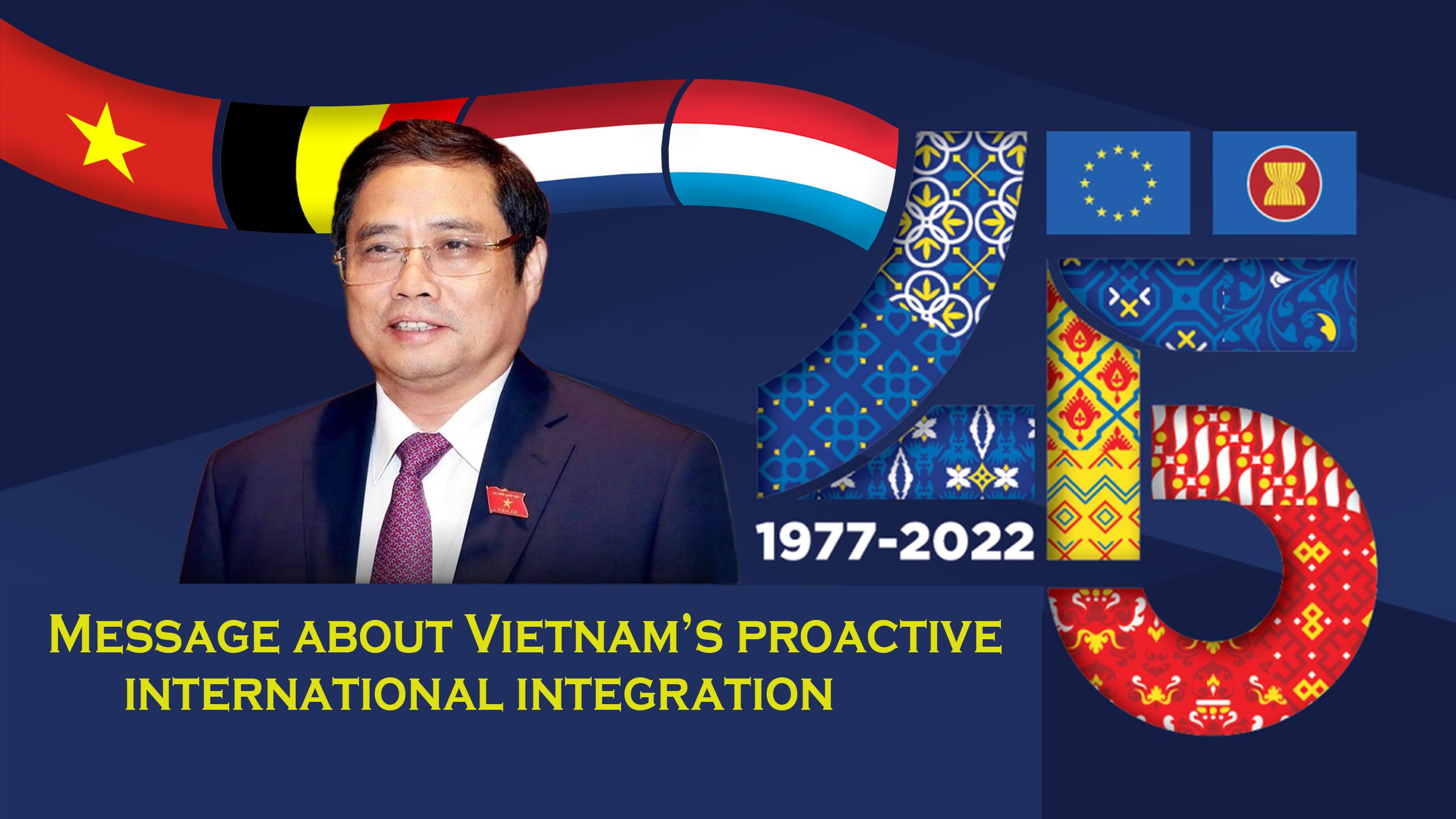
Prime Minister Pham Minh Chinh heads a Vietnamese delegation to attend the ASEAN-EU 45th Anniversary Commemorative Summit in Brussels, Belgium on December 14 and pay official visits to Luxembourg, the Netherlands and Belgium from December 9-15, at the invitations of European Council President Charles Michel, Luxembourg Prime Minister Xavier Bettel, Dutch Prime Minister Mark Rutte and Belgian Prime Minister Alexander De Croo.
The attendance of Prime Minister Pham Minh Chinh and other ASEAN leaders at the ASEAN-EU Commemorative Summit is highly significant, demonstrating Vietnam’s spirit of proactiveness, activeness and responsible contribution to ASEAN as well the international community. This is the first time that ASEAN and the EU have held a commemorative summit in the EU, with the participation of their member countries’ leaders since the dialogue relations were established in 1977.
As Vietnam is celebrating 50 years of diplomatic ties with Luxembourg, the Netherlands and Belgium in 2023, the working trip will also help to enhance and strengthen Vietnam’s relations with the three above European countries; affirming Vietnam’s increased position in the three countries’ interest and priorities in the Indo-Pacific region.
Strengthening the string linking Asia and Europe
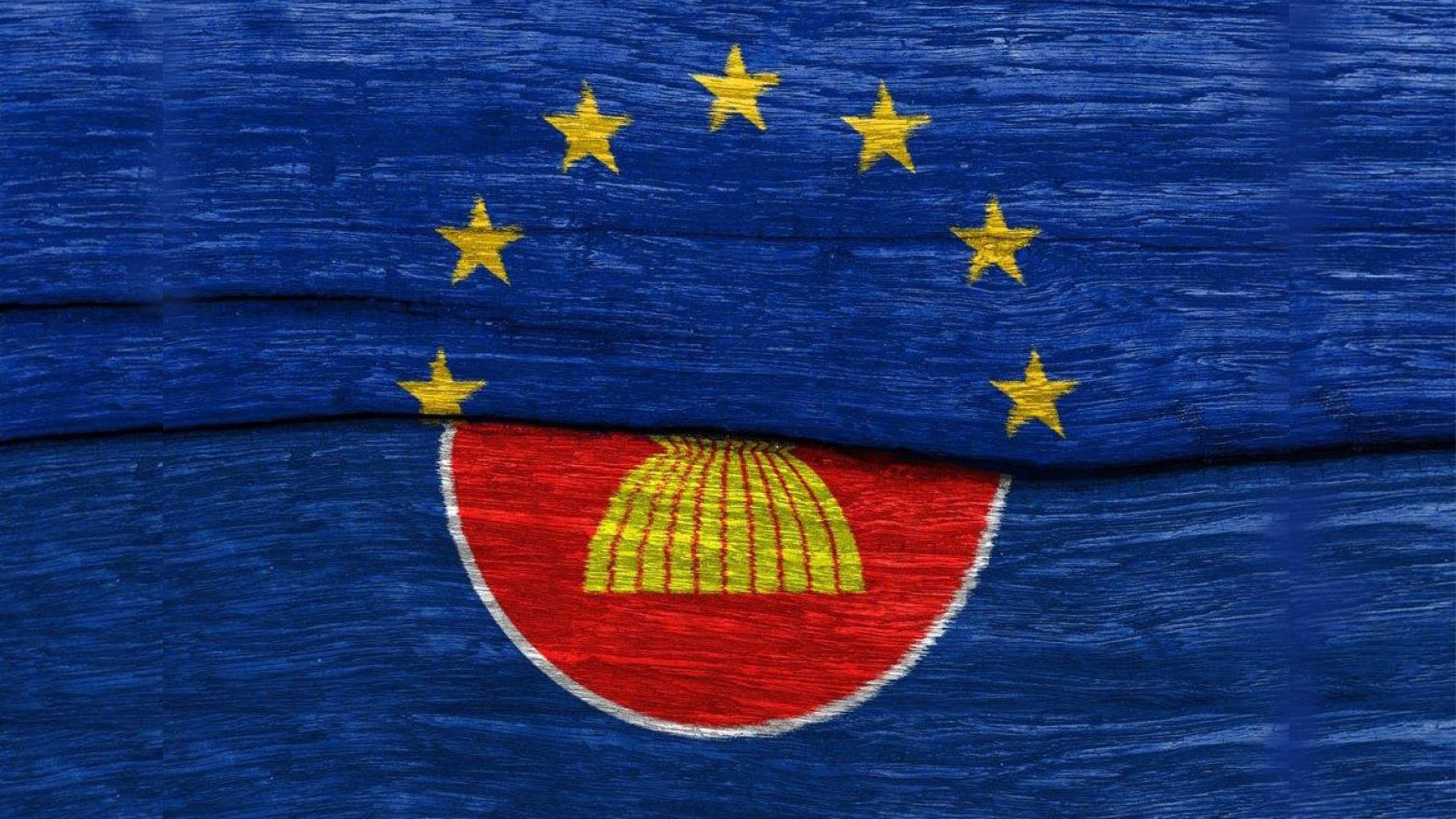
ASEAN and the EU are the two organisations of great importance, strength and reputation in Asia and Europe. The two are demonstrating their closer connection and cooperation. The ASEAN-EU dialogue relations were established in 1977 and upgraded to a strategic partnership in 2020. In the past 45 years, the bilateral relationship has developed positively, covering many fields.
On politics and security, in the EU Strategy for Cooperation in the Indo-Pacific, the EU affirms its support for ASEAN’s central role and its wish to deepen cooperation with ASEAN.
On business, trade and investment, the EU is currently ASEAN’s third-largest trading partner and second-largest foreign investor, with foreign direct investment totalling 26.5 billion USD in 2021. Meanwhile, ASEAN is the EU’s third largest trading partner outside Europe. The total trade value between the two sides reached 268.92 billion USD in 2021.
On culture, society and development cooperation, the EU is one of the first partners to support ASEAN in responding to COVID-19 and post-pandemic recovery, with the “Team Europe” support package worth 800 million EUR, the 20 million EUR programme to support the pandemic preparedness and response capacities of Southeast Asian countries and two dialogues between the two sides’ medical experts on COVID-19 vaccines.
The two sides share their support for multilateralism, trade liberalisation and economic linkage, and the settlement of disputes by peaceful means.
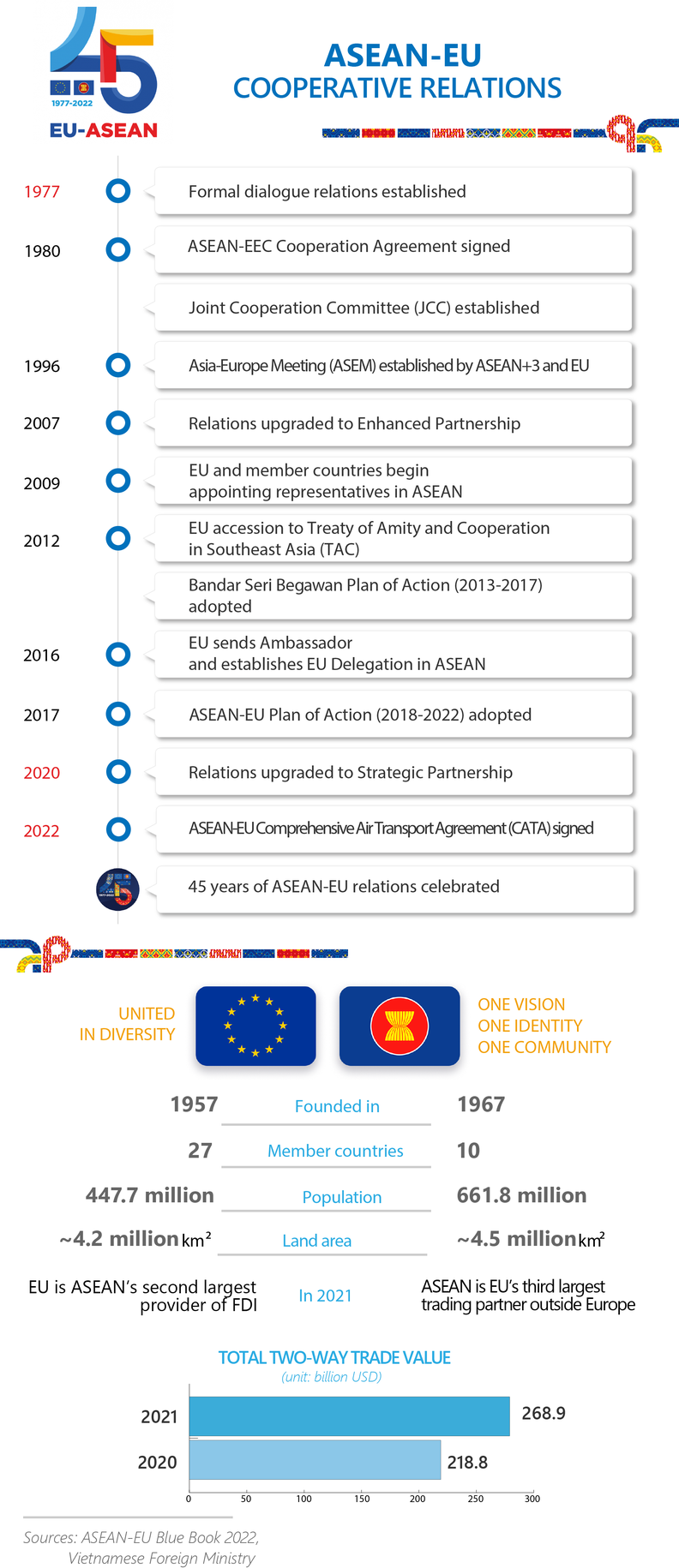
(Graphics: Hoang Ha)
(Graphics: Hoang Ha)
2022 is a year of great significance as it marks the 45th anniversary of establishing dialogue relations, between the two most prestigious regional organisations in Asia and Europe. The fact that ASEAN and the EU held the first Commemorative Summit in the EU, with the participation of leaders of member countries, since the establishment of dialogue relations in 1977, especially after the two sides established the strategic partnership in 2020, has reflected the determination of the two sides to strengthen cooperation and connectivity, in the context that the world is in a volatile period with many intertwined crises.
Vietnam is a bridge for relations between ASEAN and the EU
As a dynamic, creative and active member of ASEAN, Vietnam has always upheld its responsibility to promote extensive and effective cooperation between ASEAN and its partners, including the EU. Vietnam is the first ASEAN country to have all frameworks for cooperation in politics, economics, defence and security with the EU. There are many mechanisms for specialised cooperation, maintaining the exchange of delegations and contacts at all levels, especially at the high level. The EU is the third-largest export market, the fifth-largest import market and the sixth-largest foreign investor of Vietnam.
After more than two years of implementing the EU-Vietnam Free Trade Agreement (EVFTA), trade revenue in the first 10 months of 2022, between Vietnam and the EU, reached more than 52 billion USD, helping Vietnam rank 14th among the EU’s major trading partners.
Unlocking the potential
of Vietnam-Belgium cooperation
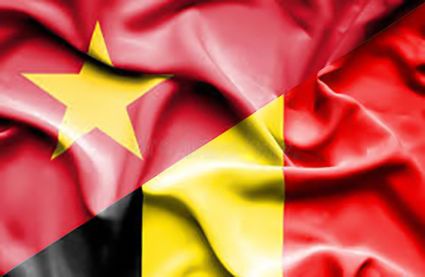
Belgium is one of the world's leading countries in iron and steel production, 24th in the world and eighth in the EU, in terms of GDP, and a centre of distribution and transhipment of goods of the EU. Located in the heart of Europe, Belgium is home to 1,100 representatives of international organisations, 600 international news agencies, 400 diplomatic missions, and 1,700 representatives of international and European companies.
As a founding member of the EU, Belgium has advocated and pioneered the process of building a strong and unified EU, implementing policies in line with the EU's common policies. On the multilateral forums, Belgium is a non-permanent member of the United Nations Security Council for the 2019-2020 tenure and is currently a member of the United Nations Human Rights Council for the 2023-2025 tenure.
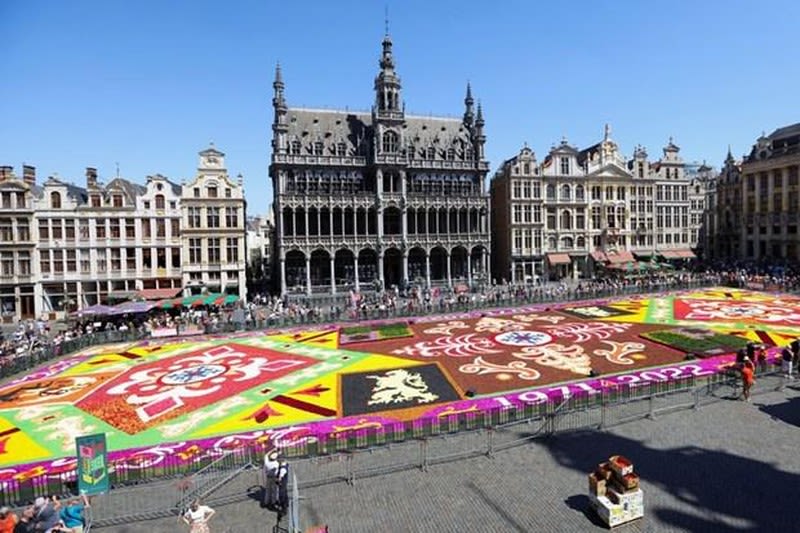
A giant carpet made entirely of fresh flowers covers the cobblestone ground of the Grand Square in Brussels, Belgium. (Source: Reuters)
A giant carpet made entirely of fresh flowers covers the cobblestone ground of the Grand Square in Brussels, Belgium. (Source: Reuters)
Belgium has maintained relatively even relations with countries in the Asia-Pacific. In Southeast Asia, Belgium has attached great importance to democracy and prosperity in promoting bilateral relations and attached great importance to relations with Malaysia, Singapore, Thailand, Vietnam, Indonesia and the Philippines. With Vietnam and Belgium, priority is given to cooperation in the environment, renewable energy, and climate change response.
Vietnam and Belgium established diplomatic relations on March 22, 1973. Although Belgium is a small market, trade relations between Vietnam and Belgium are at a high level compared to many other EU and European countries.
Belgium is Vietnam’s sixth-largest trading partner in the EU. In the period before the outbreak of the COVID-19 pandemic, bilateral trade turnover always maintained a good growth rate of 6% to 10% per year. In the first 10 months of 2022, two-way trade reached 4.068 trillion USD, including over 3.4 billion USD of Vietnam’s exports to Belgium. The structure of import and export goods between the two countries is not competitive but complementary.
Although Belgium is a small market, trade relations between Vietnam and Belgium are at a high level compared to many EU and European countries.
As of October 2022, Belgium has 82 valid investment projects in Vietnam, with a total registered capital of 1.1 billion USD, ranking 6th out of 24 EU member states investing in Vietnam.
Agriculture is a highlight in the cooperation relationship between Vietnam and Belgium. Belgium is an important market for Vietnam’s agricultural products in the EU, especially seafood and coffee.
Belgian partners have implemented many technical cooperation programmes with Vietnam through the Belgium-Vietnam Study and Consultancy Fund and the cooperation between the Vietnam National University of Agriculture and the Belgian French-speaking university community. The two sides have become strategic partners in agriculture.
In addition, the cooperation between the two countries in the fields of science-technology, education-training, culture, transportation, and others has also seen good development.
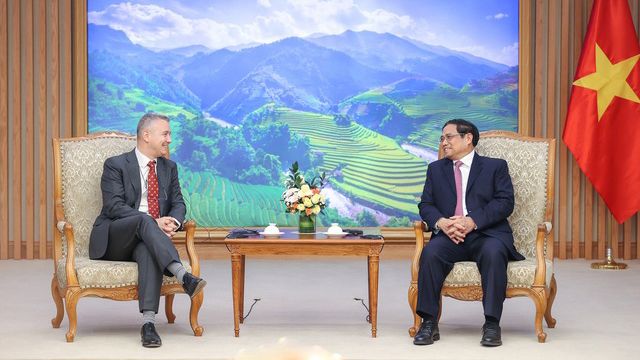
Prime Minister Pham Minh Chinh and Ambassador of Belgium to Vietnam Karl Van Den Bossche. (Photo: VGP)
Prime Minister Pham Minh Chinh and Ambassador of Belgium to Vietnam Karl Van Den Bossche. (Photo: VGP)
At the meeting with Belgian Ambassador to Vietnam Karl Van Den Bossche, in early November, Prime Minister Pham Minh Chinh affirmed that Vietnam always attached importance to relations with Belgium and highly appreciated the positive developments in Vietnam-Belgium relations over the past time, in all fields, especially politics-diplomacy, trade, and agriculture.
Ambassador to Vietnam
Vietnam and the Netherlands accompany on the path of sustainable development
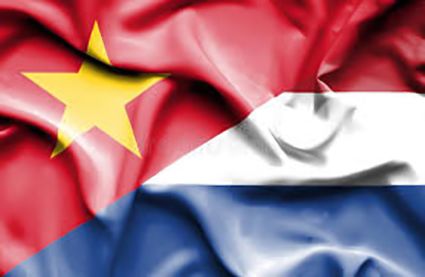
With the strength of a coastal country with fertile soil and mild climate, the Netherlands has promoted the development of agricultural products and food, horticulture, water management, logistics, energy seaports, chemical, high technology, life science and medicine. These are the leading spearhead economic sectors of the Netherlands, making the Netherlands a bright spot on the world economic development map.
The Netherlands ranked seventh in the world in terms of FDI, with a total investment inflow and outflow of 266 billion USD; placed fifth in the world on the global innovation index; topped the EU in terms of economic competitiveness; and stood tenth in the world on the human development index.
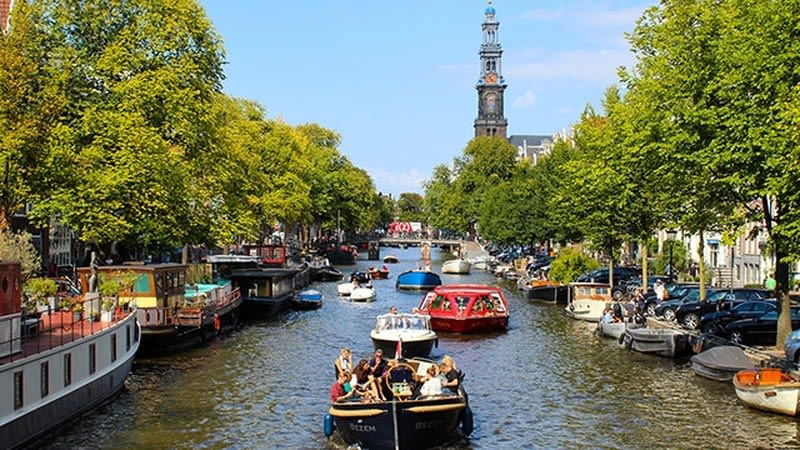
A corner of Amsterdam, the capital of the Netherlands. (Photo: WN)
A corner of Amsterdam, the capital of the Netherlands. (Photo: WN)
The Dutch economy has been moving towards green growth. The Government considers green growth necessary to sustain future economic growth while reducing and minimising environmental impact and dependence on increasingly scarce resources.
The Netherlands pursues a dynamic, active, peaceful and cooperative foreign policy and upholds the role of multilateral and mediation mechanisms. The foreign policy of the Netherlands is gradually shifting to the Indian Ocean and Pacific regions, including Asia and Vietnam.
Vietnam and the Netherlands established diplomatic ties on April 9, 1973. Over the past 50 years, the two countries have built a good friendship and cooperation. The Vietnam-Netherlands relation was assessed as a typical example of a dynamic and effective relationship, that has been developed well in all fields such as politics, diplomacy, economy, education-training, defence and security, and increasingly gone into depth. The two sides upgraded their relations to a comprehensive partnership in April 2019.
Regarding cooperation in multilateral forums, the two sides have actively promoted their cooperation at international and regional multilateral organisations and forums, especially within the framework of the United Nations, ASEM and ASEAN-EU. The two sides have also regularly held high-level contacts on the sidelines of major conferences.
In terms of economic-trade-investment areas, the trade relationship between Vietnam and the Netherlands has been constantly developing. Their trade turnover is quite large and has increased annually. Since 2002, Vietnam’s exports to the Netherlands have increased sharply, averaging about 15% per year. The Netherlands is currently one of the largest export markets of Vietnam in Europe. Besides, in recent years, the Netherlands has always been one of the largest European investors in Vietnam. Many investment projects of large Dutch corporations have been operated very effectively such as Heineken, Unilever and Royal Dutch Shell.
Regarding development cooperation, right after establishing diplomatic ties in 1973, the Netherlands began to provide Vietnam with non-refundable ODA, mainly in the fields of humanitarian, education, training and healthcare. Since January 2014, the Netherlands has changed its relationship with Vietnam to a "commercial partner". However, the Netherlands has still sponsored many social organisations in Vietnam, operating in the social and economic fields.
The Netherlands and Vietnam share many similarities, with Vietnam's Mekong River Delta facing the same water management challenges as the Netherlands. The two countries established a Strategic Partnership on Climate Change Adaptation and Water Management.
Accordingly, many projects have been implemented effectively, especially the Plan for the Mekong Delta, with a long-term vision that has made many recommendations, focusing on solving the issues of water resource management, and adapting to climate change, to help the Mekong Delta become a sustainable economic development area.
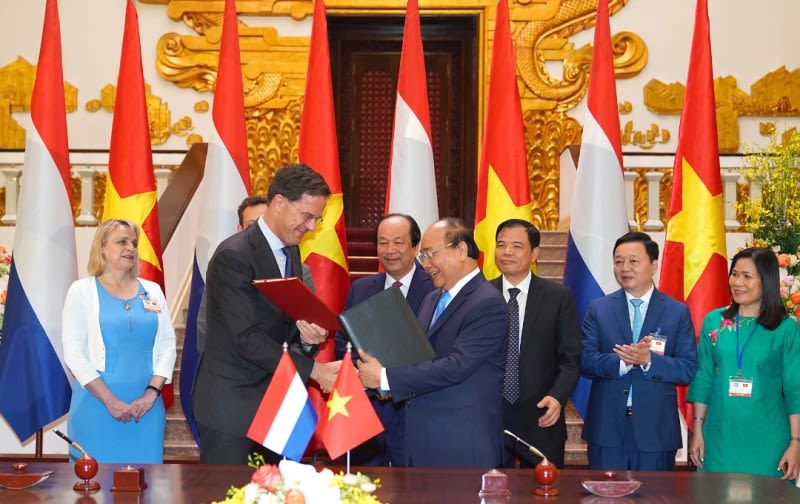
Prime Minister Nguyen Xuan Phuc and Prime Minister of the Netherlands Mark Rutte, sign a memorandum of understanding on agricultural transformation cooperation in the Mekong Delta in 2019. (Photo: VNA)
Prime Minister Nguyen Xuan Phuc and Prime Minister of the Netherlands Mark Rutte, sign a memorandum of understanding on agricultural transformation cooperation in the Mekong Delta in 2019. (Photo: VNA)
In addition, the two sides signed an agreement on a strategic partnership on sustainable agriculture and food security, deploying cooperation in the fields of cultivation, animal husbandry, and building smart agricultural models to adapt to climate change. The Netherlands is currently a major investor in Vietnam's agricultural industry and is gradually helping Vietnam build sustainable agricultural production, increasing the value of exports in the fields of horticulture, animal husbandry and aquaculture.
For education and training, over the years, more than 60 Dutch schools and more than 120 Vietnamese training institutions, have established higher education cooperation relationships. The Netherlands Education Support Office has officially operated in Vietnam since 2006, contributing to promoting scholarship information, connecting overseas students, and supporting cooperation between the universities of the two countries.
In August 2002, the Netherlands decided to put Vietnam on the list enjoying special regulations in graduate training cooperation. Many universities and research institutes in Vietnam have established cooperative relations with their partners in the Netherlands. From 2006 up to now, an average of 170 Vietnamese students each year, come to study in the Netherlands for bachelor's, master's, doctoral degrees and other short courses.
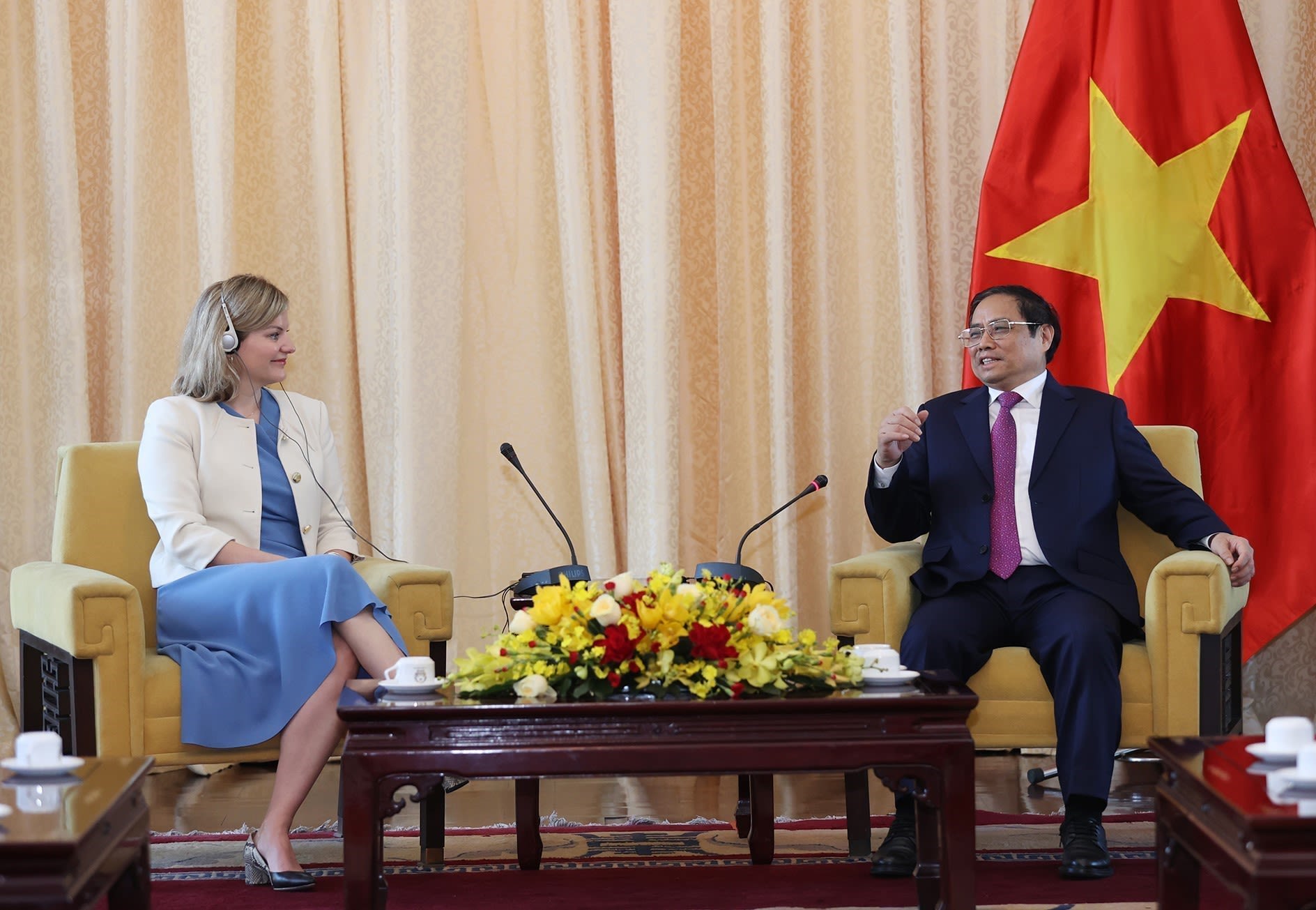
Prime Minister Pham Minh Chinh received Dutch Minister for Foreign Trade and Development Cooperation Liesje Schreinemacher. (Photo: VNA)
Prime Minister Pham Minh Chinh received Dutch Minister for Foreign Trade and Development Cooperation Liesje Schreinemacher. (Photo: VNA)
At the meeting with Dutch Minister for Foreign Trade and Development Cooperation Liesje Schreinemacher on November 28, Prime Minister Pham Minh Chinh emphasised that Vietnam always treasures the comprehensive partnership with the Netherlands, in overall good relations with the EU, especially, in the context of the two countries preparing to celebrate the 50th anniversary of the establishment of diplomatic relations in 2023.
- Minister for Foreign Trade and Development Cooperation of the NetherlandsBà Liesje Schreinemacher
Expanding cooperation
with Luxembourg
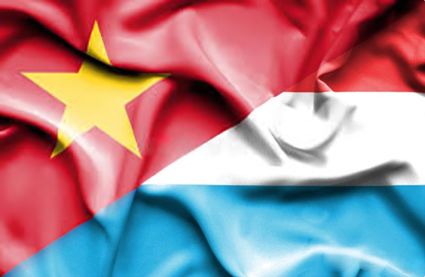
Over the years, Luxembourg has always been one of the countries with the highest economic growth in the EU, recording the highest level of GDP per capita in the world. Luxembourg's strengths are trade, banking services, insurance, chemicals, rubber, plastic, steel production, and food.
Regarding foreign policy, Luxembourg is a founding member of many international organisations, including the EU and the United Nations. Luxembourg's foreign affairs aim to promote peace and sustainable development, under the spirit of supporting multilateralism, protecting fundamental values, and contributing to economic development.
Vietnam and Luxembourg established diplomatic relations on November 15, 1973. Vietnam and Luxembourg have maintained meetings and exchanges and supported each other at multilateral forums. Accordingly, Luxembourg supported Vietnam as a non-permanent member of the United Nations Security Council during the 2020-2021 tenure, while Vietnam supports Luxembourg's candidacy for the United Nations Human Rights Council in the 2022-2024 term.
As of January 2022, Luxembourg has invested in 51 projects in Vietnam, worth 2.1 billion USD in total, focusing on several fields of construction, food processing, information and communication technology, and high technology.
Despite the outbreak of the COVID-19 pandemic, bilateral trade in 2020 reached 110.7 million USD and rose 64% to 181.6 million USD in 2021.
Regarding development cooperation, Luxembourg granted aid to Vietnam in 1993. Since then, Luxembourg commits to continue providing development aid to Vietnam and became an official member of the Vietnam Consultative Group in 1998. In March 1999, the Luxembourg Development Cooperation Agency issued the Strategy for development cooperation between Luxembourg and Vietnam. Accordingly, Vietnam is eyed as the leading country in Asia and one of the 10 key countries in the world, regarding Luxembourg’s development cooperation programme.
To date, Vietnam and Luxembourg have signed three cooperation programmes for the 2002-2005, 2006-2010, and 2011-2015 periods, worth 35 million EUR, 50 million EUR, and 42 million EUR, respectively. Luxembourg decided not to sign such programmes from 2015 onwards, as Vietnam has become a middle-income country.
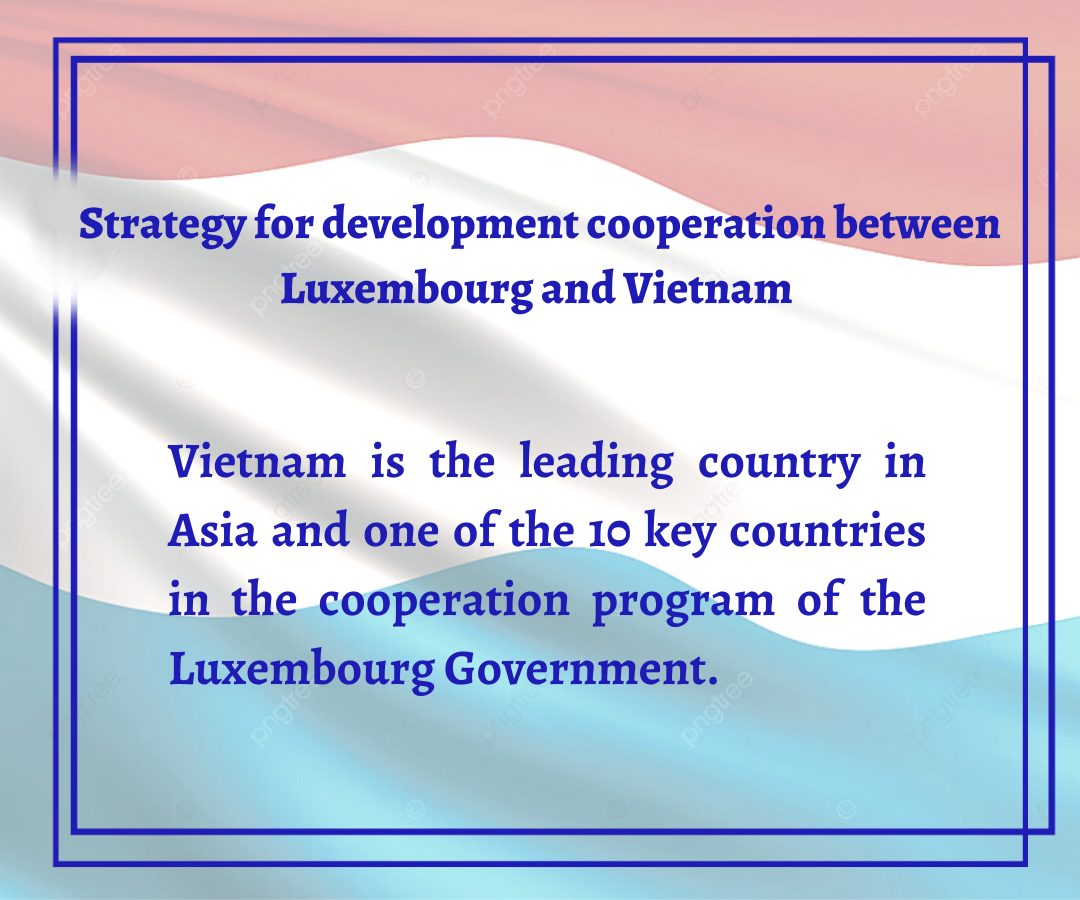
Published: December 2022
Production manager: Bich Hanh
Content: Minh Hang, Nguyen Ha
Translation: NDO
Design: Ngoc Diep - Vu Anh Tuan
Photos: VNA, Reuters